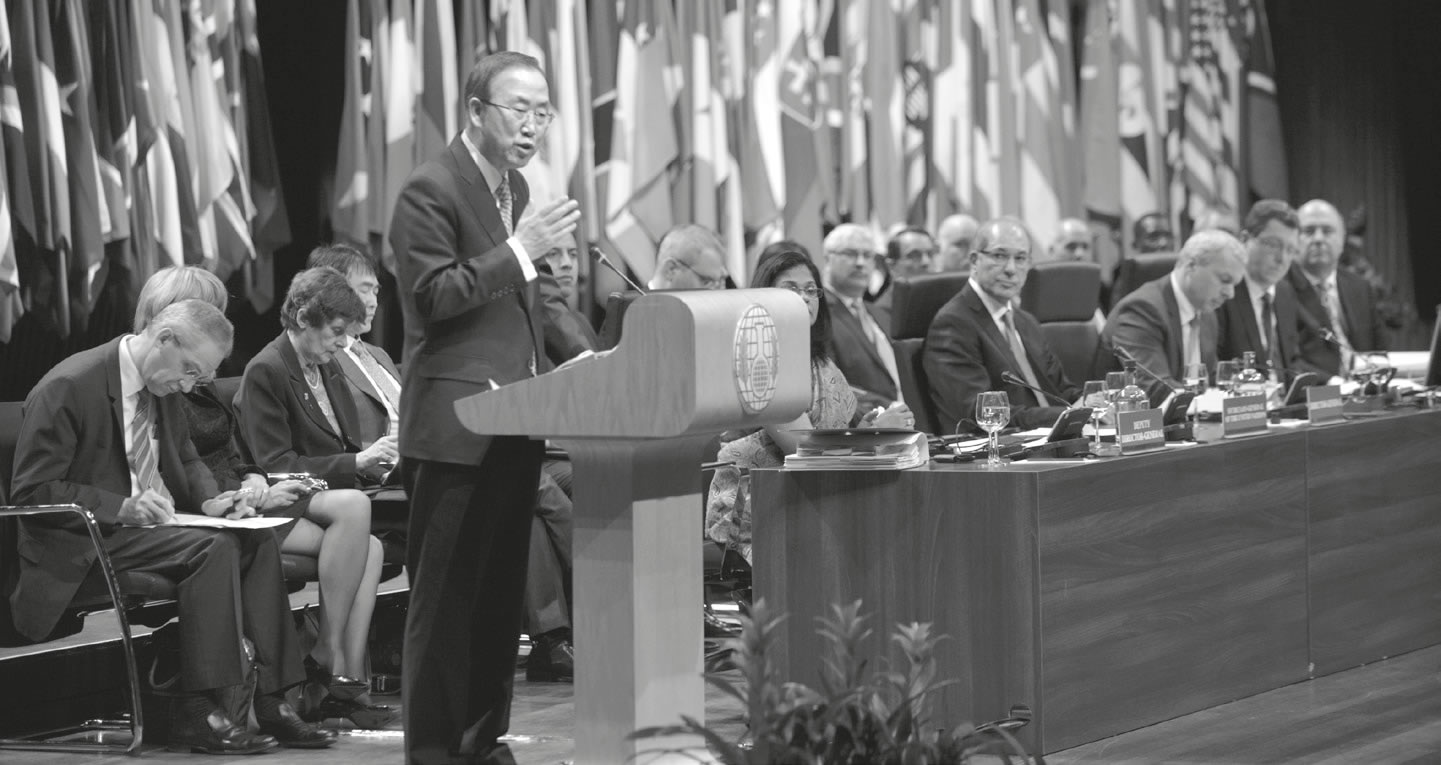Outcomes of the Third Review Conference of the CWC
The Third Review Conference of the Chemical Weapons Convention (3rd Revcon – see boxed insert) held in The Hague from 8 to 19 April 2013 was well attended by representatives from 122 of the then 188 States Parties. Australia's delegation was headed by Australia's Permanent Representative to the OPCW, Ambassador Neil Mules, and included representatives from DFAT's International Security Division, ASNO and the Department of Defence.
United Nations Secretary-General (UNSG), Ban Ki-moon, noted in his opening remarks to the Conference the importance of the OPCW's work in contributing to international peace and security. This was the first time that a UNSG had attended a Review Conference, testament in part to the enhanced cooperation between the United Nations and the OPCW through the Syrian Government's request for a UN-led investigation into allegations of chemical weapons use in Syria (also refer to Current Topics on page 20).

UN Secretary-General Ban Ki-moon addressing the Third Review Conference of the CWC, April 2013 (Image: OPCW)
During the general debate, Australia joined the overwhelming majority of States Parties in voicing its concerns about the situation in Syria, which is not yet Party to the Convention. Ambassador Mules noted the existence of large chemical weapons stockpiles in Syria and the need for the Conference to urge Syria to ensure that these remained secure until they could be destroyed under international verification.
The 3rd Revcon concluded with the adoption by consensus of a two-part Conference Report consisting of a political declaration and a comprehensive review of CWC implementation since the 2nd Revcon.
The political declaration expressed deep concern by States Parties that chemical weapons may have been used in Syria, a determination that the destruction of all existing declared chemical weapons be completed in the shortest time possible, and a commitment to adopt the necessary measures to fully implement the Convention as a matter of priority, noting that 97 States Parties still needed to adopt such measures.6
Australia's key positions, as highlighted in Australia's National Statement, were preserved in the Conference Report. The Report also provides forward-looking direction to the OPCW beyond the post-destruction phase, when all declared chemical weapons will have been destroyed. For example, States Parties expressed their commitment that the OPCW remain the global repository of knowledge and expertise on the implementation of the Convention, and requested that the Technical Secretariat present proposals for ensuring continuity of its knowledge base and expertise.
One issue that drew considerable debate was the topic of so-called incapacitating chemical agents. These can best be described as classes of toxic chemicals, other than riot control agents, which are permitted for use for law enforcement purposes. Of concern to a number of States Parties was the potential for these toxic chemicals to be developed for purposes prohibited by the Convention under the guise of 'law enforcement'. Although not included in the Conference Report, States Parties benefitted from discussing this issue for the first time within the OPCW.
As part of the OPCW's effort to improve interaction with the chemical industry, the scientific community, academia and civil society, the 3rd Revcon was unique in its level of engagement with non-government organisations (NGOs). NGOs addressed the Plenary Session of the Conference and participated in the informal discussions in the margins of, and in the lead-up to, the Conference.
Further details of the outcomes of the 3rd Revcon and other documentation can be found at https://www.opcw.org/rc3.
Review Conferences under the CWC
The Convention on the Prohibition of the Development, Production, Stockpiling and Use of Chemical Weapons and on Their Destruction (known as the Chemical Weapons Convention or CWC) entered into force on 29 April 1997 and was designed to eliminate chemical weapons worldwide, in a verifiable way. The Organisation for the Prohibition of Chemical Weapons (OPCW) oversees the global implementation of the Convention and is based in The Hague.
Article VIII paragraph 22 of the CWC requires the Conference of the States Parties (the 'Conference') to convene special sessions every five years to conduct reviews of the operation of the Convention taking into account any relevant scientific and technological developments.
The main outcomes of the CWC review conferences to date (2003, 2008 and 2013) have been a unanimous declaration of commitment by States Parties to the global chemical weapons ban and a comprehensive review of CWC implementation in the preceding five years, including a range of actions or recommendations for improving the Convention's implementation and effectiveness.
The achievements of the CWC so far have been impressive, as noted in the 3rd Revcon Report. By 31 March 2013, 55,474 metric tonnes (80 per cent) of the world's declared stockpiles of Category 1 chemical weapons (71,196 metric tonnes) had been destroyed under OPCW verification. The OPCW had conducted 5,124 inspections at 223 chemical weapon-related sites and 1,865 industrial sites within the territory of 86 States Parties. At the time of the Conference there were 188 States Parties, with five new members joining since the 2nd Revcon (Guinea-Bissau, Lebanon, Iraq, the Dominican Republic and the Bahamas). On 28 June 2013 the CWC entered into force for Somalia, making it the 189th State Party and leaving only seven countries still to ratify or accede to the treaty.7
6 This refers to the National Implementation Measures under Article VII of the CWC. Ninety-seven States Parties have not yet notified the OPCW that they have legislative and/or administrative measures covering all key areas of the Convention.
7 The states not yet party to the Convention at 30 June 2013 are: Israel, Myanmar (both have signed but not yet ratified) and Angola, Egypt, North Korea, South Sudan and Syria.